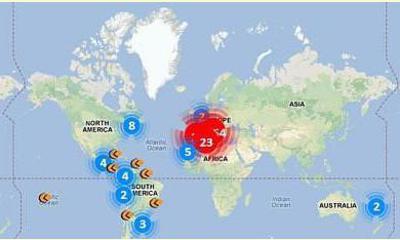|
|
The First World Time-Bank
un article par Pilar Rocio, Escola Cultura de Pau, Barcelona
The first world-wide time-bank, called Cronobank, has been established to link up all of the many local time-banks that allow the exchange of goods, services and accommodation without use of money.

click on photo to enlarge
This nonprofit organization manages an alternative exchange that is gaining more and more users worldwide, fostering social relationships and equality.
The creation of time-banks has emerged as a way to buy and sell very simply based on respect and access for everyone, with the premise of "one hour for one hour." This eliminates social exclusion and allows all users to satisfy needs through exchange of work in the same amount of time.
"All without money, but with more friends in the world" could be the motto of this online time bank that allows people around the world to exchange without money, without borders or boundaries of language services, goods, knowledge and even accommodation. The only currency is time.
How does it work? Very simple; one hour of any service and/or knowledge is valued equally for everyone and everywhere. This encourages reciprocity and exchange, with the only restriction that among users of the time-bank, there should never be any exchange of money. Users must open an account in the time-market where demands and offers are published., The main tool is a location map of the other users and a word search engine. After each transaction an assessment of the other's behavior is done, favoring relationships over profits.
The smallest exchange unit is one minute. When any participant adds time providing goods, services, knowledge and/or accommodation, it is then used to acquire what others offer in exchange. This has the advantage that it is not speculative; participants before the exchange, have the possibility of agreements in which both sides feel rewarded for their time.
Understanding how to evaluate time is very important.
An example: Laura cares for Marc´s grandmother for two hours and gets two hours of time in her account. With those two hours she asks Willy to do home gardening, so Willy takes two hours used to purchase something, and so on ...
Every hour is unique and irreplaceable. As of today, time banks are operating in many countries, and they can fulfill needs, as well as encourage cooperation and equality of the participants.
(Click here for a Spanish version of this article)
|








|
DISCUSSION
Question(s) liée(s) à cet article:
How can we get to a sustainable, peaceful economy?,
* * * * *
Commentaire le plus récent:
Annie Leonard: How to Be More than a Mindful Consumer
The way we make and use stuff is harming the world—and ourselves. To create a system that works, we can't just use our purchasing power. We must turn it into citizen power.
by Annie Leonard
posted Aug 22, 2013
Stuff activist Annie Leonard: “Consumerism, even when it tries to embrace ‘sustainable’ products, is a set of values that teaches us to define ourselves, communicate our identity, and seek meaning through accumulation of stuff, rather than through our values and activities and our community.” YES! photo by Lane Hartwell.
Since I released "The Story of Stuff" six years ago, the most frequent snarky remark I get from people trying to take me down a notch is about my own stuff: Don't you drive a car? What about your computer and your cellphone? What about your books? (To the last one, I answer that the book was printed on paper made from trash, not trees, but that doesn't stop them from smiling smugly at having exposed me as a materialistic hypocrite. Gotcha!)
Let me say it clearly: I'm neither for nor against stuff. I like stuff if it's well-made, honestly marketed, used for a long time, and at the end of its life recycled in a way that doesn't trash the planet, poison people, or exploit workers. Our stuff should not be artifacts of indulgence and disposability, like toys that are forgotten 15 minutes after the wrapping comes off, but things that are both practical and meaningful. British philosopher William Morris said it best: "Have nothing in your house that you do not know to be useful or believe to be beautiful."
Too many T-shirts
The life cycle of a simple cotton T-shirt—worldwide, 4 billion are made, sold, and discarded each year—knits together a chain of seemingly intractable problems, from the elusive definition of sustainable agriculture to the greed and classism of fashion marketing.
The story of a T-shirt not only gives us insight into the complexity of our relationship with even the simplest stuff; it also demonstrates why consumer activism—boycotting or avoiding products that don’t meet our personal standards for sustainability and fairness—will never be enough to bring about real and lasting change. Like a vast Venn diagram covering the entire planet, the environmental and social impacts of cheap T-shirts overlap and intersect on many layers, making it impossible to fix one without addressing the others.
I confess that my T-shirt drawer is so full it's hard to close. . ... continuation.

|
|









